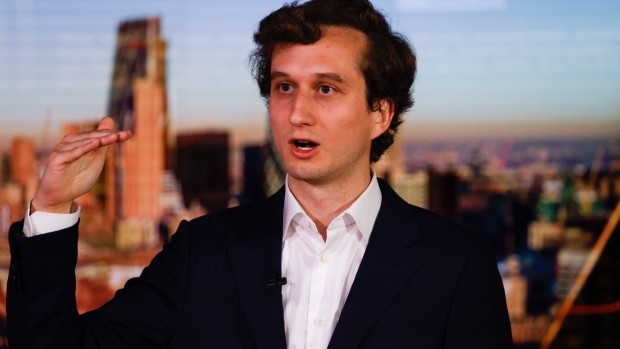Feb 1, 2024
Climate Data Service Watershed Secures $100 Million Round
, Bloomberg News

(Bloomberg) -- Watershed Technology, Inc., a software startup that helps companies track and reduce their greenhouse gas pollution, has closed a $100 million Series C fundraising. That brings its valuation to $1.8 billion and reflects the growing pressure around carbon disclosure.
A wider embrace of carbon accounting has been “15 years in the making, and now it feels like it's arriving all at once,” said Taylor Francis, a co-founder, reflecting on conversations he had with executives from a diverse range of industries meeting in Davos last month for the World Economic Forum. “Climate business is becoming the business.”
A metric that Watershed uses to measure its own progress is the “carbon under management” by its hundreds of customers. The more clients it adds, the larger that number — currently 479 million metric tons of carbon dioxide or almost 1% of the global total — will grow. First, they want this number to get bigger, as their business expands. Then, as Watershed helps companies embrace and shrink their pollution levels, the carbon under management should diminish, too. The funding round — led by Greenoaks, an early customer and investor, with participation from Sequoia Capital, Kleiner Perkins and others — will help expand operations.
Global standards for corporate carbon accounting — the Greenhouse Gas Protocol — were first developed more than 20 years ago. Since then, entrepreneurs have developed software to help companies better measure their emissions and disclose them with varying degrees of success. The exercise has become particularly thorny since the need for supply-chain carbon accounting (known to insiders as “Scope 3” emissions), became more common.
Watershed in four years has attracted clients that the company say include four of the six biggest banks and six of the 10 biggest private equity firms. It doubled its employees to 300 last year, and projects further growth to 500 people by year’s end. Watershed acquired an early environmental data firm VitalMetrics last year.
Watershed’s founders and investors see corporate attention on emissions growing more focused amid the continued rise of global greenhouse gas pollution and its effects on, among other things, extreme weather and rising seas. Businesses are also increasingly aware of the risks climate change poses to the economy. The founders — Francis, Avi Itskovich and Christian Anderson — worked together at Stripe, the payments company that has put forward aggressive climate goals and programs for several years, including the launch of the carbon removal fund Frontier. A year ago, Watershed partnered with Frontier, which includes other major tech companies and consultancies, to allow its customers to purchase carbon removal services.
The trio worked up the idea behind Watershed hiking on weekends as a “backpacking club,” Francis said, trying to figure out what kind of service could reduce or remove 500 million tons of CO2 a year by 2030. The founders’ experience watching Stripe grow its climate operation persuaded them that demand for corporate climate services would only grow in the coming years. They founded Watershed in 2019 and launched publicly within two years.
“I think they saw around the corner of what tools and software that people would need,” said Ryan Panchadsaram, advisor to John Doerr, the chairman of Kleiner Perkins and an early investor in Watershed. “The reason why this company is as big as it is, is because you have many of the — call it the Fortune 500, even 1,000 — that are all filling out these disclosures, actually trying to measure their emissions. Because if they want to manage them, they've got to measure them first.”
The Greenoaks-led investment round comes as markets for climate-related services may be maturing and diverging from the larger basket of topics known collectively as ESG, for environment, social and governance. ESG has prompted much earnest work over the last decade — and also politicization, particularly in the US, more recently.
Virtually every sector of the economy is considering if not already executing on climate ambition. Myriad motivations are driving the trend, beyond the realities of climate risk itself. Investors, customers and employees have advocated more forcefully for companies to set and meet climate targets. Regulators have also taken up the mantle, with national and subnational governments working on rules for climate disclosure that will bring thousands of companies into an alphabet soup of new disclosure regimes.
The EU’s Corporate Sustainability Reporting Directive will eventually require nearly 50,000 companies to disclose nontraditional financial information. The UK’s Streamlined Energy and Carbon Reporting mandates GHG Protocol and other disclosures for nearly 12,000 companies. The US Securities and Exchange Commission is finalizing new rules and business groups are suing California over its new law.
The movement toward mandated corporate disclosure has never followed a straight line, though, nor is it likely to. A proposed EU measure would open companies to civil liability if they failed to address environmental and human rights problems in their value chains. That rule may now be in jeopardy after criticism emerged in Germany, Bloomberg Green reported on Thursday.
Paula DiPerna is special advisor to CDP, a climate disclosure group that collects reports from more than 23,000 companies. She is also the author of the new book climate change and finance, Pricing the Priceless. In the climate context, she likened greenhouse gas disclosure to the lights that line an airplane aisle during an emergency exit.
“Disclosure is like that,” she said. “We’re facing a climate emergency, and little by little, the path is being illuminated.”
--With assistance from Tim Quinson and Lydia Beyoud.
(Updates with new information about the EU’s ESG rules in paragraph 12. A previous version corrected paragraph 7 to clarify when Watershed launched.)
©2024 Bloomberg L.P.





